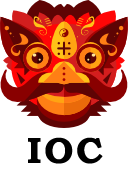What is Qigong?
Qigong is primarily the learning of Qi Control. Qi is originally a Chinese concept. It’s meaning is being explained as damp rising from boiled millet and with this indirectly an ‘élan vitale’ that can nourish mind and body in the modern China.
Through in-depth analysis of the Qi phenomenon all kind of other aspects do appear. Analysis of the written character for Qi leads to the discovery that Qi in fact means ‘the spirit that roams the earth’ or: ‘mind and matter in mutual interaction’. This makes the term on the one hand a very esoteric concept. But on the other hand it shows also that a field of friction is present between matter on the one side and the very intangible concept of mind on the other hand. And this is a description that can be dealt with scientifically. The dilemma of friction between mind and matter has been at the root of both western and eastern thought over the last few millennia. But Qi is not restricted to mind and matter. As a matter of fact it is found everywhere in nature where functional activity is found. Therefore a modern interpretation for Qi is often found in the term functional activity itself.
Qi is observable from and within a human being through a variety of phenomena, such as body-matter and thought-matter, movement, warmth, bio-electromagnetic manifestations from nervous system, bloodstream, lymph drainage and intercellular micro activities. These phenomena are transmitters of information, vibration, movement and communication. Even the surrounding environment of human beings consists thanks to similar Qi-processes. The interaction between inner and outer Qi processes does form an explanatory momentum through which health can be influenced.
Learning to (re)cognize the inner Qi-processes is the first step in the studies. Learning to harness these Qi processes is a second step. The third step is finding resonance (kanying) with your direct environment through which you can learn to control Qi processes around you and inside other people for therapeutic purposes. This is similar to that what was developed in the 18th century by A. Mesmer. The Qigong theory goes way beyond that though, but just as here in the west it also gave rise to the development of many psychological theoretical and behavioral studies.
The basis of qigong is self-observance to develop enough insight into natural and unnatural Qi processes within yourself. As a result the therapist/teacher will develop a reference system at the base of which health and disease can be judged and checked.
For responsible professional work a decent basis in both western and non-western medical and philosophical knowledge is necessary. This is mostly due to the period of cultural development we currently are witnessing. But next to this we offer students the possibility to develop his/her own qualities and talents.

